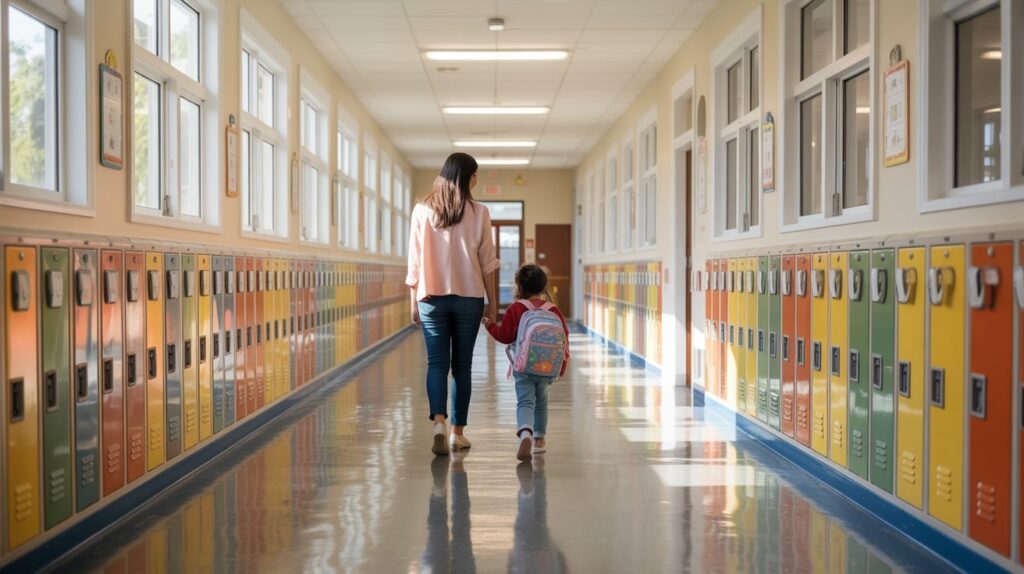When families shop for a new home, school ratings, neighborhood safety, and commute times usually top the list of priorities. But there’s one critical factor that often gets overlooked—how clean and well-maintained the local schools are.
For parents who care about their children’s health, well-being, and academic success, school cleanliness isn’t just a facilities issue. It’s a family issue. In fact, many parents are now factoring in school and education facility janitorial cleaning as part of their home-buying research. Because the physical condition of a school can have as much impact on your child as the quality of the curriculum.
Clean Schools Help Kids Stay Healthy and in Class
Schools are high-contact, high-traffic environments. Children share desks, keyboards, sports equipment, and bathrooms. Without regular, professional sanitation, these surfaces become hotbeds for bacteria, viruses, and allergens. Illness spreads quickly—especially in elementary and middle schools.
Professional cleaning services dramatically reduce the spread of germs by targeting high-touch areas and applying EPA-approved disinfectants. Schools that rely on trained janitorial teams report fewer absences, lower rates of outbreaks, and healthier student populations overall.
And from a parent’s perspective, fewer sick days mean fewer last-minute absences from work, fewer doctor’s visits, and less stress at home.
A Clean Learning Environment Supports Mental Focus
The impact of cleanliness on learning is often underestimated. Research has shown that clean, well-maintained classrooms promote concentration and reduce behavioral issues. When students walk into a tidy, organized, fresh-smelling environment, they feel more respected and more prepared to learn.
Compare that to a school with sticky floors, dusty vents, or overflowing trash bins—where students are more likely to be distracted, disengaged, or even anxious. Cleanliness affects behavior, attention spans, and even confidence. For a child, a well-kept environment signals safety and structure.
Homebuyers Should Ask These Questions About Schools
If you’re searching for a new home and planning to enroll your child in a new school, don’t stop at test scores. Ask practical questions that reflect how the school is physically maintained:
- How often are classrooms and restrooms cleaned?
- What cleaning products are used?
- Does the school outsource to professionals trained in school and education facility janitorial cleaning?
- Are there sanitation protocols in place during cold and flu season?
- How does the school handle deep cleaning after high-risk exposure or illness outbreaks?
These questions help you get a clear picture of how seriously the school—and the community around it—prioritize safety and wellness.
Clean Schools Reflect Clean Communities
A school’s upkeep says a lot about the surrounding neighborhood. Well-maintained buildings, grounds, and public spaces typically indicate higher levels of civic pride and community involvement. If the school is spotless, chances are the local parks, sidewalks, and public services are, too.
This reflects positively on property values, family satisfaction, and neighborhood trust. In other words, a clean school often signals a community that takes care of its own.
Professional Cleaning Goes Beyond Basic Tasks
School janitors do far more than sweep hallways and empty trash cans. Professional providers like EnviroClean are equipped to handle:
- Daily classroom and restroom sanitization
- Deep disinfection of cafeterias, libraries, and gymnasiums
- Odor control and air purification
- HVAC filter maintenance
- Safe chemical handling and disposal
- Summer deep cleaning of floors, furniture, and lockers
They follow CDC, OSHA, and EPA standards to keep facilities clean, compliant, and ready to serve students.
The difference between an amateur cleanup and a comprehensive cleaning service can mean the difference between preventing outbreaks—and reacting too late.
Clean Schools = Safer Schools
It’s not just about illness. Slippery floors, blocked exits, improperly stored supplies, or unsanitary restrooms can all lead to accidents or hazards that put children at risk.
Professional cleaning teams are trained to spot and report safety issues as they clean, helping school staff stay ahead of potential problems. This type of proactive maintenance helps ensure schools remain both clean and physically safe for the kids who spend hundreds of hours there every year.
Eco-Friendly Cleaning Supports Healthier Kids
Modern janitorial providers increasingly use low-VOC products and HEPA-filter equipment to protect air quality—crucial in enclosed classrooms where students and staff spend long hours. This is especially important for children with allergies, asthma, or immune sensitivities.
Services like EnviroClean prioritize green-certified products and sustainable cleaning practices that keep indoor air clean and reduce chemical exposure—all of which support better cognitive function and fewer health complaints.
Don’t Let a Dirty School Undermine a Smart Home Purchase
You can find the perfect house in a beautiful neighborhood with top-rated schools—but if your child’s learning environment is unhygienic or poorly maintained, that decision starts to feel less solid.
Before you buy, take a tour of the local schools. Peek into restrooms. Walk the hallways. Ask about how often professional cleaning teams are on-site. Talk to other parents. These small steps can offer huge insight into how well a school is managed—and how well your child will be supported there.
Reinforcing the Connection: Home, School, and Success
Your home is your base—but your child’s school is where they’ll spend most of their waking hours. That’s why both environments need to support your family’s health and goals.
Before making any long-term decisions, make sure your new community prioritizes school and education facility janitorial cleaning as part of its public service standard. It’s one of the best investments you can make in your child’s future success—and in the peace of mind you deserve as a parent.

